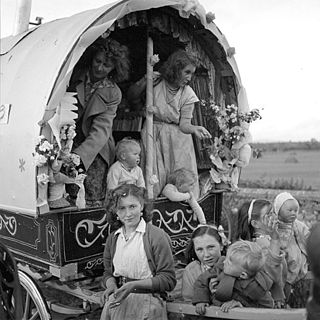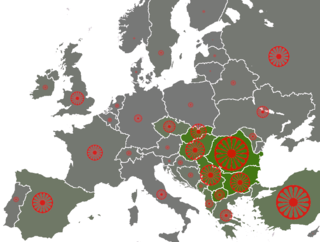The term English Travellers may refer to the following itinerant groups indigenous to England:
The Romanichal, a Romani subgroup also known as English Gypsies, are not formally regarded as Travellers. Although they traditionally lived an itinerant lifestyle, the term English Travellers formally refers to itinerant groups of indigenous origin.

Irish Travellers, also known as Pavees or Mincéirs, are a traditionally peripatetic indigenous ethno-cultural group originating in Ireland.
Pikey is an ethnic slur referring to Gypsy, Roma and Traveller people. It is used mainly in the United Kingdom and in Ireland to refer to people who belong to groups which had a traditional travelling lifestyle. Groups referred to with this term include Irish Travellers, English Gypsies, Welsh Kale, Scottish Lowland Travellers, Scottish Highland Travellers, and Funfair Travellers. These groups consider the term to be extremely offensive.
Traveler(s), traveller(s), The Traveler, or The Traveller may refer to:
A cant is the jargon or language of a group, often employed to exclude or mislead people outside the group. It may also be called a cryptolect, argot, pseudo-language, anti-language or secret language. Each term differs slightly in meaning; their uses are inconsistent. Richard Rorty defines cant by saying that "'Cant', in the sense in which Samuel Johnson exclaims, 'Clear your mind of cant,' means, in other words, something like that which 'people usually say without thinking, the standard thing to say, what one normally says'." In Heideggerian terms it is what "das Man" says.
Tinkers may refer to:

Tinker or tinkerer is an archaic term for an itinerant tinsmith who mends household utensils.
An itinerant is a person who travels habitually. Itinerant may refer to:

The Romanichal are a Romani subgroup within the United Kingdom and other parts of the English-speaking world. Most Romanichal speak Angloromani, a mixed language that blends Romani vocabulary with English syntax. Romanichal residing in England, Scotland, and Wales are part of the Gypsy, Roma, and Traveller community.
Tinker is an archaic term for an itinerant tinsmith who mends household utensils.

Norwegian and Swedish Travellers, commonly known as Romanisael, are a group or branch of the Romani people who have been resident in Norway and Sweden for some 500 years. The estimated number of Romanisael in Sweden is 65,000, while in Norway, the number is probably about 10,000.
Indigenous Norwegian Travellers are an ethnic minority group in Norway. They are a wandering people who once travelled by foot, with horse-drawn carts and with boats along the southern and southwestern coastline of Norway.
Norwegian Traveller can refer to:

Many languages are spoken, written and signed in Norway.

The Romani diaspora refers to the presence and dispersion of Romani people across various parts of the world. Their migration out of the Indian subcontinent occurred in waves, with the first estimated to have taken place between the 1st and 2nd century AD. They are believed to have first arrived in Europe in the early 12th century, via the Balkans. They settled in the areas of present-day Turkey, Greece, Serbia, Romania, Croatia, Moldova, Bulgaria, North Macedonia, Hungary, Albania, Kosovo, Bosnia and Herzegovina, Czech Republic, Slovenia and Slovakia, by order of volume, and Spain. From the Balkans, they migrated throughout Europe and, in the 19th and later centuries, to the Americas. The Roma population in the United States is estimated at more than one million.
Scottish Romani are the Romani people of Scotland. This includes Romanichal and Lowland Roma.
Gypsy or gipsy is an English name for the Romani people.
The Romani people are known by a variety of names, mostly as Gypsies, Roma, Tsinganoi, Bohémiens, and various linguistic variations of these names. There are also numerous subgroups and clans with their own self-designations, such as the Sinti, Kalderash, Boyash, Manouche, Lovari, Lăutari, Machvaya, Romanichal, Romanisael, Kale, Kaale, Xoraxai and Romungro.

There are a number of traditionally itinerant or travelling groups in Europe who are known as Travellers or Gypsies.

Romani people have been recorded in the United Kingdom since at least the early 16th century. There are estimated to be around 225,000 Romani residing in the UK. This includes the Romanichal, Kale, Scottish Lowland Roma and a sizeable population of Roma from Continental Europe, who immigrated into the UK in the late 1990s/early 2000s and after EU expansion in 2004. They are considered part of the Gypsy, Roma and Traveller (GRT) community.
Gypsy, Roma and Traveller is an umbrella term used in the United Kingdom to represent several diverse ethnic groups which have a shared history of nomadism.